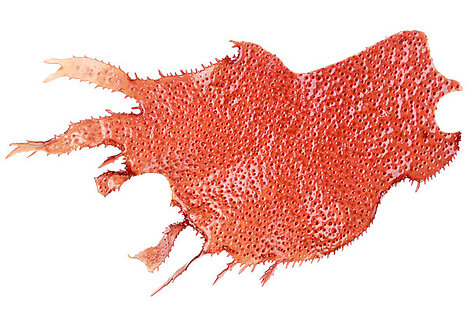Red algae

What are red algae?
Red algae are among the oldest plants on earth and are very diverse. There are over 6000 species of red algae, which differ in shape, size and habitat. Some red algae are microscopically small, others form large kelp forests. Red algae can grow in both salt water and fresh water, depending on the species and environmental conditions.
Red algae have a special ability: they can absorb light wavelengths that other plants cannot use. This allows them to survive in deeper waters where there is less sunlight. To absorb the light, red algae have special pigments that give them their red color. These pigments are called phycobilins and are also responsible for the color of blue-green algae.
Red algae contain many valuable ingredients that are healthy for humans and animals. These include:
- Vitamins: Red algae are rich in vitamins A, B12 and C, which are important for the immune system, blood formation and skin health.
- Minerals: Red algae provide plenty of calcium, magnesium, iron and iodine, which are needed for bones, muscles, blood and the thyroid gland.
- Trace elements: Red algae also contain trace elements such as zinc, copper, manganese and selenium, which are involved in many metabolic processes.
- Dietary fiber: Red algae have a high proportion of dietary fiber, which aids digestion and increases the feeling of satiety.
- Proteins: Red algae have a relatively high protein content compared to other plants. The proteins from red algae are easy to digest and contain all the essential amino acids.
- Antioxidants: Red algae have a high antioxidant capacity, which means they can neutralize free radicals that can cause cell damage.
What are the effects of red algae for dogs?
Red algae can have various positive effects for dogs, depending on the type and amount fed. Here are some possible benefits of red algae for dogs:
- Boosting the immune system: the vitamins and antioxidants from red algae can support your dog's immune system and protect them from infections.
- Improving skin and coat health: Vitamins A and C and the trace elements zinc and copper from red algae can improve your dog's skin and coat health and prevent skin problems such as dandruff or itching.
- Regulation of thyroid function: The iodine from red algae can regulate your dog's thyroid function and prevent iodine deficiency. Iodine is important for the formation of thyroid hormones, which influence the metabolism.
- Promoting bone and dental health: The calcium and magnesium from red algae can promote your dog's bone and dental health and prevent osteoporosis or tartar.
- Stimulate digestion: The fiber from red algae can stimulate your dog's digestion and counteract constipation or diarrhea. In addition, some types of red algae, such as Lithothamnium Calcareum, can bind excess stomach acid and thus alleviate stomach problems.
What should you look out for when feeding red algae to dogs?
Red algae can have many benefits for dogs, but there are also some things you should consider before feeding it to your dog. Here are some tips on how to use red algae for dogs safely and correctly:
- Choose the right type of red algae: Not all red algae is suitable for dogs. Some types can be toxic or have unwanted side effects. For example, blue-green algae, which belong to the red algae family, can cause liver damage or nerve damage. Therefore, make sure that you only feed red algae species that are suitable for dogs, such as Nori or Lithothamnium Calcareum.
- Choose the right form of red algae: Red algae comes in different forms, for example as fresh or dried algae leaves, as algae powder or as algae tablets. The form of red algae influences the dosage and absorption of the ingredients. Fresh or dried algae leaves are usually less concentrated than algae powder or algae tablets. In addition, fresh or dried algae leaves can contain impurities that can be harmful. Therefore, make sure that you only buy high-quality products that are suitable for dogs.
- Choose the right amount of red algae: The amount of red algae you feed your dog depends on various factors, such as your dog's weight, age and health. Too much red algae can lead to an overdose, which can lead to side effects such as vomiting, diarrhea or thyroid problems. Too little red algae can lead to underdosing, which can lead to a lack of nutrients. Therefore, make sure that you follow the manufacturer's feeding recommendations or ask your vet for advice.
- Observe your dog's reaction to red algae: Every dog reacts differently to red algae. Some dogs tolerate it well and benefit from its positive effects. Other dogs may be allergic or sensitive to red algae and experience side effects. Therefore, monitor your dog's reaction to red algae and adjust their diet if necessary. If your dog shows signs of intolerance or poisoning, such as vomiting, diarrhea, loss of appetite or lethargy, you should consult a vet immediately.
Red algae is an interesting ingredient for dogs that can have many health benefits. They can boost the immune system, improve skin and coat health, regulate thyroid function, promote bone and dental health and stimulate digestion. However, you should make sure that you only feed suitable types, forms and amounts of red algae for dogs and monitor your dog's reaction.
If you notice any signs of hypersensitivity or poisoning in your dog, you should see your vet immediately. We are not a substitute for a vet, but we try to be as accurate as possible. Every dog reacts differently and we recommend you get a second opinion or consult your vet if in doubt.
Stay healthy and take good care of your four-legged friend!😊